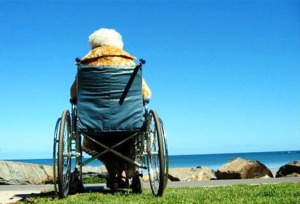 Chantal Huinink’s horrific bus trip from Toronto prompts a call for better training and transit equipment — and a complaint system for disability-law violations.
Chantal Huinink’s horrific bus trip from Toronto prompts a call for better training and transit equipment — and a complaint system for disability-law violations.
It was the trip from Hell.
Except temperatures were hovering close to –20 C last Wednesday evening when Chantal Huinink, a master’s student at Wilfrid Laurier University, arrived at the Toronto Coach Terminal to board a Greyhound bus back to Kitchener.
Huinink, who uses an electric wheelchair, was in Toronto with a friend to see Les Misérables and had booked the trip with the bus company’s accessibility office a week before.
But what should have been a one-hour journey turned into a bone-chilling, four-hour ordeal. The 30-year-old social work and divinity student came close to being seriously injured and then stranded in the freezing cold, due to faulty equipment and untrained drivers. Huinink finally had to be rescued by firefighters.
“This was an emotionally traumatic and physically troubling experience,” she said in an interview this week. “I believe it violated the Accessibility for Ontarians with Disabilities Act in many ways, and I really want to make sure this doesn’t happen to anyone in the future.”
Provincial regulations requiring public transit companies to provide accessible equipment and trained operators have been in force in Ontario since 2011, said disability activist David Lepofsky.
“The Access for Ontarians with Disabilities Act (AODA) has important enforcement provisions. It has stiff fines, provisions for directors and inspectors, and appeals to a tribunal,” he said.
“Yet as far as we can discover, there is no Ontario government phone number that people like Chantal can call to report a barrier that violates the AODA,” he said. “We have been asking for this since 2012.”
A spokesperson for Eric Hoskins, the minister of economic development, trade and employment, said the act sets standards and doesn’t play a role in resolving complaints between individuals and organizations.
Individuals are encouraged to contact organizations directly. If they feel their rights are still not being upheld, they can file a complaint with the Ontario Human Rights Tribunal, said Gabe DeRoche.
But Lepofsky said people with disabilities shouldn’t be forced to go to the Human Rights Commission.
“We have never said (the government) should send an investigator for every complaint,” he said. “But there should be a number to call to lodge a complaint so the government can track what’s going on.”
Huinink said she has faced faulty equipment and untrained drivers on Greyhound and GO Transit buses before. But this trip was particularly egregious.
Huinink arrived at the bus terminal to find the wheelchair lift ready for her. But she had to wait for 25 minutes in frigid temperatures while the driver struggled unsuccessfully to untangle the tie-downs for the lift.
Finally, at 8:30 pm, she was asked to take another bus, which she boarded without incident. Anxious not to miss her pre-booked accessible-transit ride home from the Kitchener bus terminal, Huinink didn’t argue when the driver used only two straps to secure her wheelchair.
But when the driver hit the brakes, Huinink’s wheelchair jerked forward and her feet became painfully wedged in the seats in front. Unable to move the seats — and apparently unaware of how to operate the side door to access the straps and free Huinink — the driver returned to the bus terminal for help.
With no other accessible buses available, the driver and other Greyhound staff eventually used a cable to secure everything in place.
Since Huinink had now missed her connection in Kitchener, Greyhound staff agreed the driver would drop her off at the university.
To see more about this wild ride read here TheStar.
